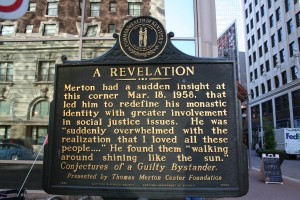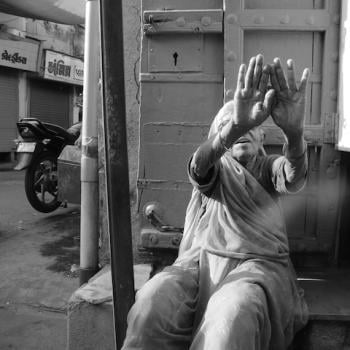
So from the perspective of these nearly two weeks of reflections on Merton, what is the meaning of that mystical experience we began with, the one that happened at a busy intersection in Louisville? Merton described it this way in Conjectures of a Guilty Bystander:
“In Louisville, at the corner of Fourth and Walnut, in the center of the shopping district, I was suddenly overwhelmed with the realization that I loved all those people, that they were mine and I theirs, that we could not be alien to one another even though we were total strangers. It was like waking from a dream of separateness, of spurious self-isolation in a special world, the world of renunciation and supposed holiness… This sense of liberation from an illusory difference was such a relief and such a joy to me that I almost laughed out loud… I have the immense joy of being man, a member of a race in which God Himself became incarnate. As if the sorrows and stupidities of the human condition could overwhelm me, now I realize what we all are. And if only everybody could realize this! But it cannot be explained. There is no way of telling people that they are all walking around shining like the sun.”
Merton’s biographer William H. Shannon says that by the time of this experience in 1958, Merton had become a very different kind of monk than when he entered the monastery in 1941. “One of the things going on in him was the maturing realization, born of this contemplation, that it is not possible to leave the world in any real sense,” he writes. “There is simply no place else to go…The experience challenged the concept of a separate ‘holy’ existence lived in a monastery. He experienced the glorious destiny that comes simply from being a human person and from being united with, not separated from, the rest of the human race.”
That experience in Louisville happened in the middle of an ordinary day, when Merton was running errands for the monastery. And when you visit that spot today, it still seems like an ordinary sort of place, until you know the story of what happened there.
But consider this: when I visited that spot, I wasn’t alone in remembering Merton. An older man and a young woman were there as well, and as I approached them I overheard him telling her the story of what had happened there, his voice barely audible above the sound of cars. It made me happy to see that I was not the only pilgrim that day at the busy intersection in Louisville. Merton’s words still echo there, even after all these intervening years.
“Then it was as if I suddenly saw the secret beauty of their hearts, the depths of their hearts, where neither sin nor desire nor self-knowledge can reach, the core of their reality, the person that each one is in God’s eyes. If only they could all see themselves as they really are. If only we could see each other that way all the time.”














